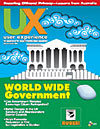Encouraging participatory democracy
Abstract
For the first time in history, a wide distribution of technology allows citizens to get involved in public governance and participate in institutional life on a very regular basis. Yet websites of public authorities are barely taking advantage of the power of the participatory citizen.
Two factors play a key role in this gap. First, the average citizen is not well informed about how basic democratic institutions function, which dramatically reduces the citizen’s capacity to influence the democratic process. Websites can help reduce the complexity of public institutions and get people to understand the way institutions and public administrations function and behave. Second, access to public services online is increasingly separated from institutional information. While online service sites are popular, the role of the institutional sites is not clear. The authors argue that these sites can and should take on the role of a two-way communications tool on topics of policy and politics, support knowledge sharing on areas covered by the authority, and create maximum transparency on what the public administration actually does.
To better understand the opportunities, challenges and evolutions that are affecting public institution websites, the authors studied the main sites of 30 public authorities and identified several innovative approaches. A first analysis shows that a lot remains to be improved. Almost all the sites analysed share three characteristics: (1) policy priorities are not concisely communicated and easy to understand, (2) there is only limited innovation in how regional or municipal institutions present themselves; and (3) there are no tools for active participation.
However, some of the studied sites provide elements of innovation that can be used as models and inspirations. The authors conclude that to improve information access, better communication strategies are needed and to increase participation, better usability is of crucial importance.
The magazine also contains Michele Visciola’s review of the book Ambient Findability by Peter Morville.
The peer-reviewed content of User Experience is not available online but printed copies of the magazine can be bought in the UPA Store.





[…] UX magazine pubblica un articolo scritto da me e Michele Visciola, mio socio, sulla democrazia partecipativa. Da un’analisi di 30 siti governativi, è emerso che la partecipazione potrà essere stimolata anche grazie ad un miglioramento dell’usabilità . Leave a Reply […]